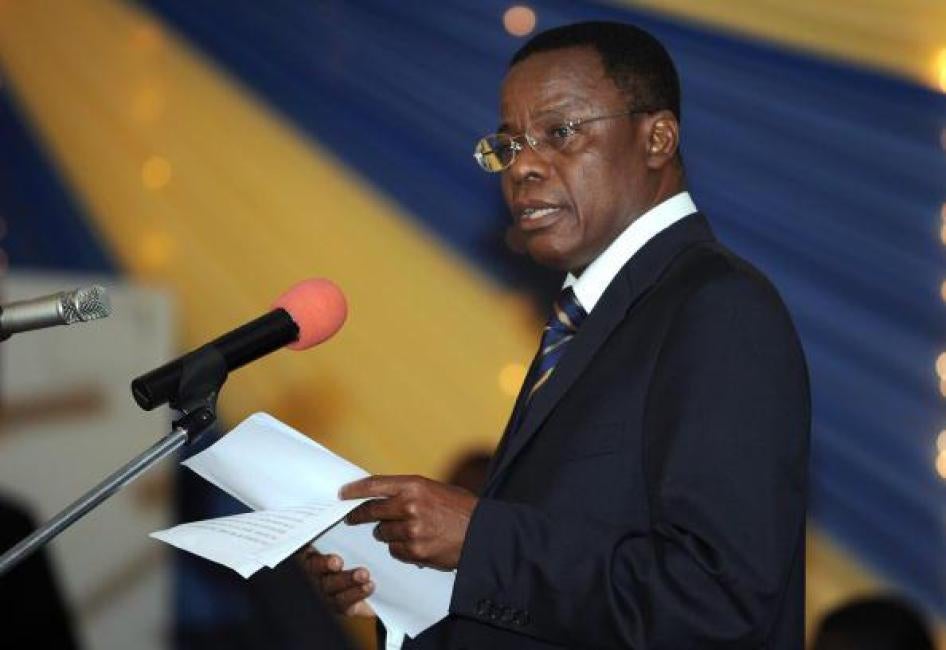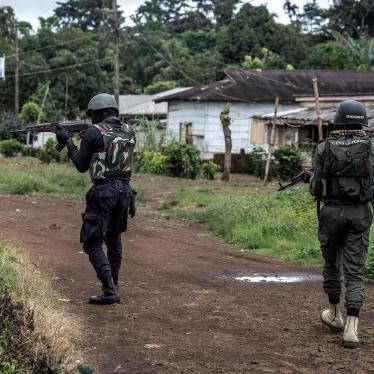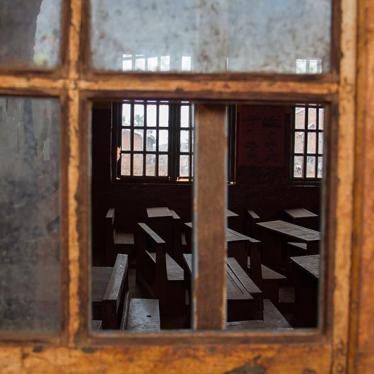Update February 1, 2019: In the evening of January 30 Human Rights Watch learned that Kamto is currently held at the building of the Special Operations Groups (Groupement spécial d’opérations, GSO) in Yaoundé. According to his lawyer, Kamto could be charged with: insurrection, hostility against the homeland, criminal association, threats to public order, rebellion, group rebellion, and inciting insurrection. Human Rights Watch has also received reports there are currently up to 200 people, of whom the majority are MRC supporters, in detention following protests on January 26.
(Nairobi) – Cameroonian authorities have arrested political opponents and violently broken up peaceful protests since January 26, 2019. The country’s opposition leader, Maurice Kamto, was arrested in Douala on January 28 for what appears to be politically motivated reasons and remains in detention.
The crackdown appears to be coordinated, as opposition figures allied with Kamto – Albert Dzongang, Christian Penda Ekoka, Alain Fogue, and Célestin Djamen – were also arrested on January 28. Djamen was arrested and taken from a hospital where he was receiving treatment for injuries suffered on January 26 while protesting.
“The Cameroonian government’s crackdown shows that it is unwilling to accept a role for opposition parties, sending a chilling message to those who would dare challenge the status quo,” said Ida Sawyer, deputy Africa director at Human Rights Watch. “The latest crackdown was consistent with the methods of a government whose security forces have committed grave abuses against civilians and dissenting voices in recent years.”
The government should free all those arrested or charge them with a crime, permit protests to go forward, and investigate and punish police violence, Human Rights Watch said.
The whereabouts of Kamto and his colleagues are currently unknown. Human Rights Watch spoke with Emmanuel Simh, a lawyer for Kamto and the others detained, who confirmed that he filed a request to the General Prosecutor in the capital, Yaoundé, seeking access to his clients. He has yet to be provided access. Under Cameroonian law, the police must present any person accused of a crime before a judge within 48 hours, which can be renewed twice.
On October 7, 2018, President Paul Biya won his seventh term. Biya has been in power since 1982. In 2008, the constitution was changed, removing term limits. The October elections were marred by low turnout, especially in the country’s two Anglophone regions, and by allegations of fraud. Biya was declared the winner with 71 percent of the vote, with Kamto, the leader of the opposition party Cameroon Renaissance Movement (CRM), officially receiving 14 percent. On October 8, Kamto declared that he had won the elections and called on Biya to hand over power peacefully.
Kamto’s supporters held small-scale protests since the elections.
The arrests follow a violent crackdown on protesters by Biya’s government against Kamto’s supporters who were gathered across Douala on January 26. The protesters called for a recount of the vote, amongst other demands. Witness accounts, medical records, video clips, and images obtained by Human Rights Watch show the heavy-handed and targeted reaction of the Cameroonian state security agents toward the protesters.
As the protest started, police officers, including elements of the Équipes spéciales d’intervention rapide, a special police unit, used teargas and rubber bullets from close range to disperse the crowd, including demonstrators. Witnesses reported chaotic scenes as people fled.
Among those injured was Michelle Ndoki, a well-known lawyer close to Kamto, and Célestin Djamen, both shot in the leg at close range with rubber bullets. Other protesters were treated in several hospitals in Douala for minor injuries after police beat them.
“I was near the General Hospital in Douala,” a protester told Human Rights Watch. “I saw the police firing teargas and Michelle Ndoki as she ran away.” The protester said that a police officer followed Ndoki as she sought shelter in a nearby restaurant. He loaded his gun and fired rubber bullets at her five times, the witness said. “The first time he missed her, hitting a woman who was also hiding in there. The second, third, and fourth time he didn’t miss her, and the bullets all hit her in the leg,” he said.
According to the opposition party, dozens of its supporters were also arbitrarily arrested at protests in various cities across the country on January 26, including 47 people still in detention in Bafoussam. René Emmanuel Sadi, the communication minister, said on January 26 that the protesters had attempted to destabilize the country.
Cameroonian security forces have a long track record of abusive conduct. In October 2017, they used excessive force against demonstrations organized in the country’s Anglophone regions, killing up to 20 people.
Further pro-CRM demonstrations are expected across Cameroon in the coming weeks. The police should refrain from any unnecessary or excessive use of force, Human Rights Watch said. The authorities should also immediately charge or release all arrested protesters and political opponents and open an independent and transparent investigation into the use of force by the police on January 26.
Cameroon was elected to the United Nations Human Rights Council on October 12, 2018.
“The Cameroon government can’t claim to respect human rights while using the standard playbook of abusers to crush opposition and curtail freedom of speech and assembly,” Sawyer said. “Cameroon’s international partners should condemn Biya’s blatant and unwarranted clampdown on the political opposition.”









